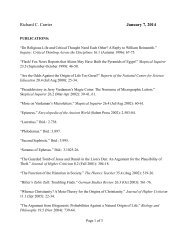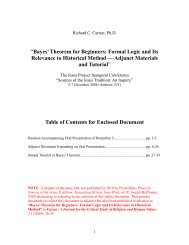Cultural History of the Lunar and Solar Eclipse in ... - Richard Carrier
Cultural History of the Lunar and Solar Eclipse in ... - Richard Carrier
Cultural History of the Lunar and Solar Eclipse in ... - Richard Carrier
Create successful ePaper yourself
Turn your PDF publications into a flip-book with our unique Google optimized e-Paper software.
will see <strong>the</strong>m, 76 <strong>and</strong> <strong>the</strong> frequency at which a solar eclipse will be visible <strong>in</strong> <strong>the</strong> same<br />
location is barely thrice <strong>in</strong> every thous<strong>and</strong> years, even though, count<strong>in</strong>g all partial<br />
eclipses, <strong>the</strong> average rate <strong>of</strong> occurrence for any given location is one every two to three<br />
years. 77<br />
Naturally, predict<strong>in</strong>g solar eclipses requires very sophisticated ma<strong>the</strong>matics -- it<br />
is necessary to know to a good approximation <strong>the</strong> true sizes <strong>of</strong> sun, moon, <strong>and</strong> Earth,<br />
<strong>and</strong> <strong>the</strong>ir true distances, <strong>and</strong> Aaboe describes how Ptolemy 78 was <strong>the</strong> first extant<br />
author to have done this with any worthwhile success, but Ptolemy was only repeat<strong>in</strong>g<br />
<strong>and</strong> exp<strong>and</strong><strong>in</strong>g <strong>the</strong> work <strong>of</strong> Hipparchus. 79 It is difficult to date Hipparchus, but it is<br />
possible that his work was extent <strong>in</strong> <strong>the</strong> time <strong>of</strong> Gallus, <strong>and</strong> it is certa<strong>in</strong> that it was extant<br />
<strong>in</strong> <strong>the</strong> time <strong>of</strong> Cicero. 80 The difficulty <strong>of</strong> all <strong>the</strong> necessary calculations, <strong>and</strong> <strong>the</strong> paucity<br />
<strong>of</strong> precise data <strong>in</strong> antiquity, is shown by <strong>the</strong> eclipse ‘predicted’ by <strong>the</strong> edict <strong>of</strong> Claudius,<br />
discussed above: modern calculations show that it was only a 30% magnitude eclipse <strong>in</strong><br />
Rome, <strong>and</strong> so was essentially <strong>in</strong>visible. However, Claudius’ astronomers could not<br />
have known that with any reliability. 81 Dio’s passage mentions <strong>the</strong> fact that location<br />
affects visibility, 82 <strong>and</strong> it is probable that <strong>the</strong> Claudian edict did as well. At any rate,<br />
Ptolemy was also well aware <strong>of</strong> <strong>the</strong> imprecision <strong>of</strong> prediction, 83 especially his<br />
measurements <strong>of</strong> lattitude <strong>and</strong> longitude for those wish<strong>in</strong>g to make predictions outside<br />
<strong>of</strong> Alex<strong>and</strong>ria. 84 Likewise, eclipses will start <strong>and</strong> stop at different times <strong>and</strong> have a<br />
different duration for observers <strong>in</strong> different locations. This was very well known by <strong>the</strong><br />
time <strong>of</strong> Ptolemy, 85 <strong>and</strong> even Pl<strong>in</strong>y <strong>the</strong> elder notes <strong>the</strong> fact, 86 who cites records which<br />
show that <strong>the</strong> times <strong>of</strong> <strong>the</strong>se events were be<strong>in</strong>g recorded <strong>in</strong> distant places <strong>and</strong> <strong>the</strong>se<br />
records were be<strong>in</strong>g compared. 87 Pl<strong>in</strong>y also claims that it was long known how to<br />
predict <strong>the</strong> very hour <strong>of</strong> solar <strong>and</strong> lunar eclipses, 88 which was very probably true, s<strong>in</strong>ce<br />
Ptolemy would merely cont<strong>in</strong>ue <strong>the</strong> work <strong>of</strong> Hipparchus. At any rate, such predictions<br />
76 There are <strong>of</strong> course a great many ‘eclipses’ <strong>in</strong> which <strong>the</strong> core lunar shadow misses Earth entirely (Schove, p. xvi);<br />
it was possible for an ancient calculation to predict an eclipse without recogniz<strong>in</strong>g that, for one or more reasons<br />
(location <strong>of</strong> viewer, clouds, etc.), it would not be visible to anyone, a fact known to Pl<strong>in</strong>y <strong>the</strong> elder, Natural <strong>History</strong>,<br />
2.10 (57).<br />
77 Cf. Schove, p. xv.<br />
78 Cf. Almagest, 6.7-8; 6.10.H352-5.<br />
79 Pl<strong>in</strong>y, for <strong>in</strong>stance, records that Hipparchus accomplished this, mak<strong>in</strong>g a successful eclipse almanac runn<strong>in</strong>g <strong>the</strong><br />
course <strong>of</strong> <strong>the</strong> next several centuries, Natural <strong>History</strong>, 2.9 (53-4); cf. Newton, pp. 123-6.<br />
80 Newton places <strong>the</strong> last eclipse reputedly observed by Hipparchus on 23 March 126 B.C., p. 105-8.<br />
81 Schove, p. 7. Incidentally, this event confirms Claudius’ birthday as August 1.<br />
82 Dio Cassius 60.26.3.<br />
83 Almagest, 6.7.H505.<br />
84 Ibid., 6.10.<br />
85 Almagest, 4.1.H267.<br />
86 Natural <strong>History</strong>, 2.72 (180).<br />
87 Ptolemy’s report <strong>of</strong> <strong>the</strong> same k<strong>in</strong>ds <strong>of</strong> records collected by Hipparchus shows that <strong>the</strong> earliest records <strong>of</strong> this k<strong>in</strong>d<br />
<strong>in</strong> <strong>the</strong> West date only to around 200 B.C. Hipparchus had to consult Babylonian astronomers to go fur<strong>the</strong>r back for<br />
reliable records, cf. Almagest, 3.2, 4.5, 5.11.<br />
88 Natural <strong>History</strong>, 25.5.10.








